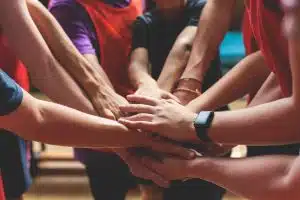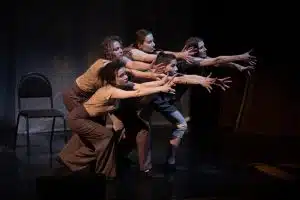15 Collaborative Extracurriculars That Showcase Teamwork
Collaborative extracurriculars are key to boosting your college application, and demonstrating your knack for collaboration and commitment to collective goals. This guide zeroes in on group activities that not only make your application shine but also arm you with important life skills for your academic and career future.
Here, you’ll find tips on building and showcasing those all-important teamwork skills, setting you up for success in college and the professional world.
Collaborative Extracurriculars That Showcase Teamwork
Participating in extracurricular activities emphasizing teamwork is essential to strengthen a college application. These varied activities, from sports teams to cultural clubs, demonstrate an applicant’s capability to collaborate on shared objectives and cultivate vital skills like leadership, communication, and problem-solving.
Here are 15 collaborative extracurriculars that showcase teamwork:
1. Sports Teams
Participation in sports teams, ranging from soccer to swimming, is a testament to a student’s commitment and capability to work collaboratively towards shared objectives. Being part of a team teaches invaluable lessons in dedication, discipline, and the dynamics of group effort. Through regular practices, games, and tournaments, athletes develop their physical prowess and critical interpersonal skills such as communication, leadership, and the ability to perform under pressure.
This environment fosters a sense of unity and trust among teammates as they strive to achieve their goals and represent their school with pride. Moreover, involvement in sports illustrates a balance between academic and extracurricular commitments, highlighting a well-rounded individual prepared for the challenges of college and beyond.
2. Debate Club
Being part of a debate club enriches students with the ability to engage deeply with complex topics, encouraging them to research extensively, construct compelling arguments, and work closely with team members. In representing their school at competitions, debaters refine their public speaking and persuasive skills, thriving in an intellectually stimulating environment.
This extracurricular activity not only sharpens critical thinking but also promotes effective teamwork and a respect for diverse perspectives, preparing students for active and thoughtful participation in future academic and societal dialogues.
3. Student Government
Participation in student government is one of the collaborative extracurriculars that showcase teamwork and serves as a clear indicator of a student’s leadership abilities and commitment to serving and improving their school community. Through roles in student government, individuals learn about planning, decision-making, and executing projects that benefit their peers.
Collaborating with students, faculty, and administrators, student government members develop a deeper understanding of leadership, governance, and the importance of clear communication and negotiation. Being part of student government demonstrates a proactive approach to problem-solving and team-building, qualities highly valued in higher education and professional settings.
4. Model United Nations (MUN)
Model United Nations offers students a unique platform to engage in simulation of United Nations conferences, where they collaborate to understand and debate global issues from the perspective of different countries. This extracurricular activity demands extensive research, critical thinking, and teamwork, as participants must work together to craft resolutions and navigate complex diplomatic negotiations.
MUN fosters a deep understanding of international relations and the art of diplomacy, enhancing participants’ public speaking, negotiation, and conflict-resolution skills. Through this collaborative effort, students gain insights into the workings of the UN and develop a global mindset and the ability to work effectively in diverse teams.
5. Academic Decathlon/Quiz Bowl Teams
Academic Decathlon and Quiz Bowl teams present students with the opportunity to showcase their knowledge across a wide range of subjects, from science and mathematics to literature and the arts. These competitions require team members to collaborate closely, leveraging each other’s strengths to cover various topics included in the contests.
The preparation involves rigorous study sessions, strategy meetings, and practice quizzes, all of which cultivate a team-oriented approach to learning and problem-solving. Participants develop not only a broad knowledge base but also critical thinking and quick recall abilities, all within a supportive team environment.
6. Theatre Productions/Drama Club
Theatre productions and drama club participation embody the essence of collaboration, as students must work together closely to bring a story to life on stage. Whether acting, directing, designing sets, or managing backstage operations, each member plays a vital role in the production’s success. This collaborative environment fosters creativity, communication, and a strong sense of community among participants.
Students learn the importance of reliability, flexibility, and dedication to the collective vision of the production. The immersive experience of theatre enhances artistic talents and teaches participants valuable life skills in teamwork, time management, and public presentation, enriching their personal and academic development.
7. Music Ensembles
Another example of collaborative extracurriculars that showcase teamwork is joining a music ensemble, whether it’s a band, orchestra, choir, or small ensemble. Members collaborate closely to master musical pieces, synchronize their performances, and create harmonious melodies. Each musician plays a vital role in the ensemble, contributing their unique talents to the collective sound.
Rehearsals and performances provide opportunities for students to develop not only their musical abilities but also essential teamwork skills such as communication, cooperation, and mutual respect. Being part of a music ensemble fosters a sense of camaraderie and shared achievement as members work together towards the common goal of creating beautiful music that resonates with audiences.
8. Robotics Club
In the robotics club, teams collaborate to design, build, and program robots for competitions, requiring a combination of technical skills and teamwork. Members bring together their expertise in engineering, coding, and problem-solving to tackle complex challenges and achieve common objectives. Through hands-on projects and collaborative problem-solving, students learn to work effectively in teams, communicate ideas clearly, and adapt to changing circumstances.
Additionally, participating in robotics competitions such as the FIRST Robotics Competition and the National Robotics Challenge provides valuable opportunities for students to showcase their skills, network with peers, and gain recognition for their collective efforts. Overall, the robotics club offers a dynamic environment where students can develop both technical proficiency and essential teamwork abilities, preparing them for future success in STEM fields and beyond.
9. Community Service Organizations
Volunteering as a group in community service organizations, such as Key Club or Interact Club, is a meaningful way to demonstrate teamwork while making a positive impact on society. Members collaborate on various service projects, ranging from environmental clean-ups to organizing fundraisers for local charities. Working together towards a common cause fosters a sense of unity and shared purpose among group members.
Through volunteering activities, students learn to communicate effectively, delegate tasks, and support each other in achieving their goals. Moreover, engaging in community service teaches valuable lessons in empathy, civic responsibility, and social awareness, instilling a sense of compassion and altruism in participants.
10. Peer Tutoring Programs
Collaborative extracurriculars that showcase teamwork also encompass peer tutoring programs, where individuals collaborate with classmates to support their academic success. This demonstrates leadership, patience, and the ability to work one-on-one with others. As a peer tutor, individuals provide guidance, explain concepts, and offer encouragement to their peers, helping them overcome academic challenges and achieve their goals.
Through peer tutoring, participants not only reinforce their understanding of academic subjects but also cultivate empathy, adaptability, and effective communication skills. Moreover, serving as a peer tutor allows individuals to make a positive impact on their peers’ academic journey while honing their leadership abilities and contributing to a culture of academic excellence within their school community.
11. Environmental Clubs
In environmental clubs, students work with others to plan and implement sustainability initiatives or clean-up projects, highlighting teamwork and a commitment to environmental stewardship. Members collaborate to identify environmental issues, develop action plans, and organize events to raise awareness and promote sustainable practices.
Working together towards common environmental goals fosters a sense of responsibility, camaraderie, and shared purpose among club members. Moreover, involvement in environmental clubs provides opportunities for students to develop leadership skills, build connections with like-minded peers, and make a positive impact on their school or local community.
12. Yearbook Committee
Working on the yearbook committee is one of the collaborative extracurriculars that showcase teamwork and students’ creativity. It entails collaborating with fellow students on a year-long project that requires team collaboration in design, photography, writing, and editing. Committee members work together to capture and commemorate the memorable moments and achievements of the school year, from sports events to academic milestones.
From brainstorming themes to selecting photos and writing captions, committee members collaborate closely to produce a high-quality school yearbook that preserves cherished memories for years to come. Being part of the yearbook committee offers valuable hands-on experience in journalism and design and fosters friendships, creativity, and a sense of pride in capturing the essence of the school year.
13. Science Olympiad Teams
Being part of a Science Olympiad team involves participating in events that demand teamwork in scientific problem-solving and innovation. Team members collaborate to tackle challenging tasks, conduct experiments, and apply scientific principles to real-world problems. Through hands-on experiments and collaborative brainstorming sessions, participants develop critical thinking skills, communication abilities, and an appreciation for scientific inquiry.
Moreover, involvement in Science Olympiad teams provides valuable opportunities for students to apply their knowledge, showcase their skills, and compete with peers on a regional, state, or national level, enriching their academic experience and preparing them for future pursuits in STEM fields.
14. Cultural Clubs
Cultural clubs offer students a platform to engage in activities that promote cultural awareness and inclusion, fostering collaboration on events, presentations, and educational programs. Through collaborative planning and execution of cultural activities, participants learn about different traditions, customs, and perspectives and develop cross-cultural communication and teamwork skills.
Working together towards common cultural goals fosters a sense of unity and appreciation for diversity among club members. Moreover, involvement in cultural clubs provides opportunities for students to celebrate their heritage, learn from others, and contribute to creating a more inclusive and culturally vibrant school community.
15. Entrepreneurship Clubs
One of the popular collaborative extracurriculars that showcase teamwork is participating in entrepreneurship clubs. It involves working with a team to develop and pitch business ideas, manage projects, and potentially start a real enterprise, teaching valuable collaboration and leadership skills.
Club members collaborate to brainstorm innovative business concepts, conduct market research, and create business plans that address market needs and opportunities. Collaborative discussions and feedback sessions refine participants’ ideas, allowing them to develop strategic plans and allocate resources effectively.
Why Is It Significant for Students to Develop Teamwork Skills?
So, why is it significant for students to develop teamwork skills? Students can pool their strengths to address complex problems more effectively through collaboration on projects or group studies. This collaboration encourages a deeper understanding of the subject matter as students engage in discussions, share ideas, and learn from each other’s perspectives, leading to a more cohesive and comprehensive learning experience.
Additionally, teamwork promotes personal growth by cultivating essential skills such as effective communication, conflict resolution, and collaborative problem-solving, all of which contribute significantly to personal development.
These skills are not only valuable in academic settings but also in various aspects of life. In today’s highly interconnected and fast-paced workplaces, teamwork drives organizational success and fosters a positive work environment. Collaborative efforts enable employees to leverage their collective expertise and skills to solve complex problems, deliver high-quality results, and adapt to changing circumstances.
Effective teamwork fosters a culture of innovation, creativity, and continuous improvement within organizations. Moreover, working together promotes a supportive and inclusive work environment where employees feel valued and empowered to contribute their ideas and insights.
Teamwork enhances job satisfaction, employee engagement, and organizational performance, positioning companies for long-term success in today’s competitive marketplace.
The Role of Teamwork in College Admissions
The role of teamwork in college admissions has become paramount in the increasingly competitive landscape over the past years. Admissions committees significantly emphasize a student’s ability to collaborate effectively and contribute positively to a diverse and collaborative college community.
Colleges and universities seek students who excel academically, possess strong interpersonal skills, and work well with others. Demonstrating teamwork skills signals to admissions officers that a student is capable of thriving in a collaborative environment, fostering a sense of community, and making meaningful contributions to campus life.
Whether through participation in extracurricular activities, group projects, or community service initiatives, students who have demonstrated their ability to collaborate, communicate effectively, and resolve conflicts constructively are more likely to stand out in the college admissions process.
Admissions committees recognize the importance of teamwork in preparing students for success in higher education and beyond, as collaboration is essential for academic success, personal growth, and future professional endeavors.
How Students Can Develop Teamwork Skills
Teamwork is a critical skill in both academic and professional environments. It’s the glue that holds a group together and ensures that everyone is working towards a common goal. For students, developing strong teamwork skills can enhance learning experiences, improve social interactions, and set the stage for future career success.
Here are some strategies on how students can develop teamwork skills.
Active Participation and Engagement
- Join Team-Based Extracurriculars: Engage in collaborative extracurriculars that showcase teamwork, such as clubs, sports teams, or group projects that interest you. This is the first step in experiencing teamwork in a structured environment.
- Take the Initiative: Don’t wait for others to lead the way. Propose ideas, suggest strategies, and volunteer for tasks. Taking the initiative shows commitment and can inspire your teammates to contribute more actively.
- Communicate Effectively: Always express your thoughts clearly and listen actively to others. Effective communication prevents misunderstandings and builds trust within the team.
- Embrace Diversity: Learn to work with teammates from different backgrounds and with varying viewpoints. This diversity can lead to more creative solutions to problems.
- Be Reliable: Ensure you complete your assigned tasks on time and to the best of your ability. Reliability is key to gaining the trust of your teammates.
Seeking Leadership Roles
- Identify Opportunities: Look for chances to lead, whether it’s being the captain of a sports team, the leader of a group project, or an officer in a club.
- Step Up in Small Ways: Leadership isn’t always about holding a title. Offering to organize resources, mediate disputes, or mentor new team members are all forms of leadership.
- Learn from Current Leaders: Observe how leaders in your teams handle challenges and guide the group. Take note of the qualities that make them effective, and think about how you can incorporate these into your own leadership style.
- Seek Feedback: Ask for input on your leadership abilities from both peers and mentors. Constructive criticism can be invaluable in helping you improve.
Reflective Practice
- Keep a Journal: After team activities or projects, take some time to jot down what went well, what didn’t, and why. This can help you understand the dynamics of teamwork and your role within it.
- Evaluate Your Performance: Be honest with yourself about your strengths and areas for improvement. Reflect on how your actions affected the team’s performance and what you could do differently next time.
- Learn from Failures: Every team faces setbacks. Instead of getting discouraged, analyze these situations to learn valuable lessons about teamwork, leadership, and problem-solving.
- Set Personal Goals: Based on your reflections, set specific, achievable goals for improving your teamwork skills. This could involve enhancing your communication, becoming more reliable, or taking on more leadership responsibilities.
Developing teamwork skills is a journey that involves continuous learning and practice. By actively participating in team-based activities, seeking out opportunities that showcase leadership, and engaging in reflective practice, students can significantly enhance their ability to work effectively with others. This benefits their academic and extracurricular endeavors and prepares them for successful careers.
Maximizing Your Teamwork Experiences in College Applications
When applying to college, showcasing your teamwork experiences can significantly enhance your application. Here’s how to articulate your teamwork experiences and skills to make your college application stand out.
Describing Your Teamwork Experiences
- Be Specific: When describing team-based activities, focus on specific roles you played and tasks you handled. This gives admissions officers a clear picture of your contributions and leadership within the team.
- Quantify Achievements: Whenever possible, quantify your team’s achievements. For example, mention any measurable outcomes of your projects or competitions, such as rankings, awards, or the impact of your work.
- Use Action Verbs: Start sentences with action verbs like “led,” “coordinated,” “developed,” or “implemented” to make your roles and achievements stand out.
Highlighting the Impact of Teamwork Skills
- Personal Growth: Discuss how working in a team has helped you grow personally. This could include becoming more open-minded, improving your time management skills, or becoming a better listener.
- Skill Development: Highlight key skills developed through teamwork, such as leadership, communication, and problem-solving. Provide examples of how these skills were applied in team settings and the positive outcomes.
- Contributions to Success: Showcase specific instances where your involvement directly contributed to your team’s success. This demonstrates your ability to work effectively with others and make a tangible impact.
Integrating Teamwork into Your Narrative
- Personal Statements and Essays: Weave your experiences participating in collaborative extracurriculars that showcase teamwork into your personal statements and essays to tell a compelling story about your personal development. This approach helps admissions officers understand who you are beyond your grades.
- Interviews: Prepare to discuss your teamwork experiences during college interviews. Practice articulating your thoughts clearly and concisely, focusing on how these experiences have prepared you for college.
Letters of Recommendation
- Choose Wisely: Select recommenders who have witnessed your teamwork and leadership abilities firsthand. Your recommender could be a coach, club advisor, or teacher overseeing your participation in team-based activities.
- Provide Context: Help your recommenders by providing them with specific examples of your teamwork and leadership experiences. This will enable them to write more detailed and impactful letters.
By effectively maximizing your teamwork experiences in college applications, you can present a strong case for your admission. Colleges value students who bring academic excellence and the ability to contribute to a collaborative and dynamic community.
In summary, students are encouraged to actively participate in collaborative extracurriculars that showcase teamwork for their personal growth and to strengthen their college applications, showcasing their readiness to contribute to a community that thrives on collaboration.












































